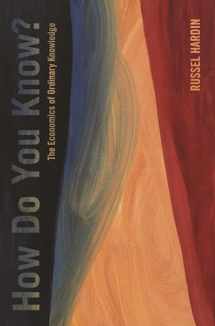
How Do You Know?: The Economics of Ordinary Knowledge
ISBN-13:
9780691137551
ISBN-10:
0691137552
Author:
Russell Hardin
Publication date:
2009
Publisher:
Princeton University Press
Format:
Hardcover
256 pages
FREE US shipping
on ALL non-marketplace orders
Marketplace
from $28.00
USD
Marketplace offers
Seller
Condition
Note
Seller
Condition
New
Book details
ISBN-13:
9780691137551
ISBN-10:
0691137552
Author:
Russell Hardin
Publication date:
2009
Publisher:
Princeton University Press
Format:
Hardcover
256 pages
Summary
How Do You Know?: The Economics of Ordinary Knowledge (ISBN-13: 9780691137551 and ISBN-10: 0691137552), written by authors
Russell Hardin, was published by Princeton University Press in 2009.
With an overall rating of 4.5 stars, it's a notable title among other
books. You can easily purchase or rent How Do You Know?: The Economics of Ordinary Knowledge (Hardcover) from BooksRun,
along with many other new and used
books
and textbooks.
And, if you're looking to sell your copy, our current buyback offer is $0.3.
Description
How do ordinary people come to know or believe what they do? We need an account of this process to help explain why people act as they do. You might think I am acting irrationally--against my interest or my purpose--until you realize that what you know and what I know differ significantly. My actions, given my knowledge, might make eminently good sense. Of course, this pushes our problem back one stage to assess why someone knows or believes what they do. That is the focus of this book. Russell Hardin supposes that people are not usually going to act knowingly against their interests or other purposes. To try to understand how they have come to their knowledge or beliefs is therefore to be charitable in assessing their rationality. Hardin insists on such a charitable stance in the effort to understand others and their sometimes objectively perverse actions. Hardin presents an essentially economic account of what an individual can come to know and then applies this account to many areas of ordinary life: political participation, religious beliefs, popular knowledge of science, liberalism, culture, extremism, moral beliefs, and institutional knowledge. All of these can be enlightened by the supposition that people are attempting reasonable actions under the severe constraints of acquiring better knowledge when they face demands that far outstretch their possibilities.


We would LOVE it if you could help us and other readers by reviewing the book
Book review

Congratulations! We have received your book review.
{user}
{createdAt}
by {truncated_author}


